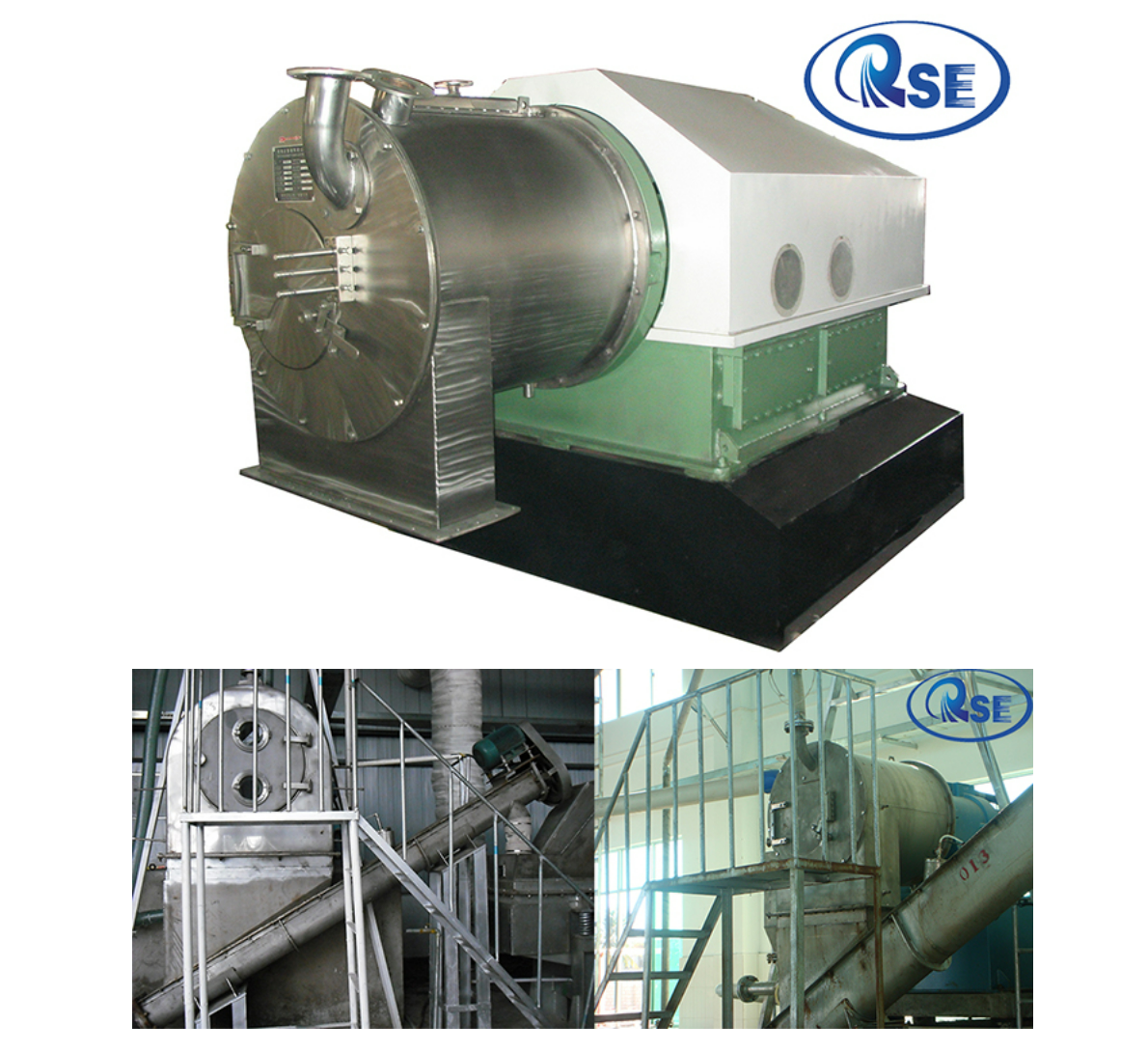The two-stage pusher centrifuge is a dedicated filtration and separation system that achieves efficient solid-liquid separation. The centrifuge uses a continuous feed mechanism with intermittent cake discharge, making it ideal for applications that require high throughput and efficient dewatering.
Salt Centrifuge
Product Detail
Product Description
The double-stage pusher centrifuge is a continuous feed, intermittent discharge filter centrifuge. It combines the advantages of continuous operation and achieves low solid moisture content. It is widely used in chemical, pharmaceutical, and salt production industries.
As a leader in modern industrial separation technology, its unique double-drum design significantly expands application scope and greatly improves separation efficiency and precision. The centrifugal process is divided into two closely related but functionally distinct stages, each carefully optimized to ensure efficient and thorough separation under optimal conditions.
Stage 1: Primary Dehydration
In this stage, the centrifuge generates strong centrifugal force through high-speed rotation to quickly separate free liquid from the surface of solid particles.
Goal: Quickly remove most of the free water.
Process Control: Optimized by adjusting speed, conveying capacity, and screen size to ensure the structural integrity of solids during dehydration.
Stage 2: Deep Drying and Fine Separation
The second drum, equipped with finer screens and precisely controlled flow fields, further processes the material to reduce residual moisture without damaging the solid particles.
Result: Reduced moisture content, improved product appearance and physical properties, resulting in higher quality raw materials for subsequent processes.
Main Features
Continuous Operation, Intermittent Discharge
Designed for continuous feeding and batch discharge.
Advantages:
High throughput suitable for large-scale production.
Improves operating efficiency and minimizes downtime.
High Throughput
Designed for processing large volumes of material.
Advantages:
Increases productivity.
Reduces the need for multiple pieces of equipment, optimizing space and costs.
High Separation Factor
Achieves high separation factors for efficient solid-liquid separation.
Advantages:
Excellent dewatering performance.
Produces low-moisture, high-purity solid products.
Two-Stage Dewatering
Two interconnected stages for unprecedented dewatering performance.
Benefits:
Extremely low final moisture content.
Maintains product structure and physical integrity.
Effective Cleaning and Discharge
Advanced cleaning mechanisms customizable to material and process requirements.
Benefits:
High product purity through thorough removal of embedded contaminants.
Efficient separation and recovery of wash and mother liquors.
Low Energy Consumption
Energy-efficient design with reduced power consumption.
Benefits:
Lower operating costs.
Supports sustainable production.
Consistent Processing
Consistent operation across all batches.
Benefits:
Consistent moisture and product quality.
Reliable and repeatable results.
Final Moisture < 5%
Achieves final product moisture content less than 5%.
Benefits:
Facilitates further processing or packaging.
Meets stringent low moisture quality standards.
Technical Specifications
Model: Two-stage Pusher Centrifuge
Separation Factor: High, adjustable
Capacity: Varies by model and application
Power Consumption: Low, energy-saving design
Material: Stainless steel (304/316L), corrosion-resistant
Final Moisture: < 5%
Washing Performance: High efficiency, independent discharge of washing liquid and mother liquor
Operation Mode: Continuous feeding, intermittent discharge
Application Areas
Chemical Industry
Use: Dehydration of chemical sludge and separation of compounds.
Advantages: Improves product quality through efficient separation.
Pharmaceutical Industry
Use: Filtration and dehydration of intermediate and final products.
Advantages: Ensures high purity and low moisture content in pharmaceutical raw materials.
Salt Production
Use: Dehydrates salt crystals to achieve optimal dryness.
Advantages: Produces high-quality salt suitable for further processing or packaging.
Food Processing
Use: Separation and dehydration of food ingredients and additives.
Advantages: Improves food quality and shelf life by reducing moisture content.
Installation & Maintenance
Installation
Site Preparation: Ensure the installation area is clean, level, and equipped with adequate space and infrastructure.
Installation: Follow manufacturer’s instructions to assemble and integrate with existing systems.
Calibration: Calibrate settings for precise and optimal operation.
Maintenance
Daily Cleaning: Regular cleaning to prevent buildup and maintain hygiene.
Inspection: Check for wear or damage; replace parts as needed.
Lubrication: Lubricate gears, bearings, and moving parts to reduce friction.
Adjustment: Monitor and optimize operating settings to ensure consistent performance.
Safety & Compliance
Safety Features
Overpressure Protection: Prevents equipment damage caused by overpressure.
Leak Detection: Sensors monitor and correct leaks to ensure safe operation.
Compliance
Industry Standards: Meets global safety and quality standards.
Environmental Regulations: Designed to minimize environmental impact and support sustainable production.

Contact us now for a quote or more information

